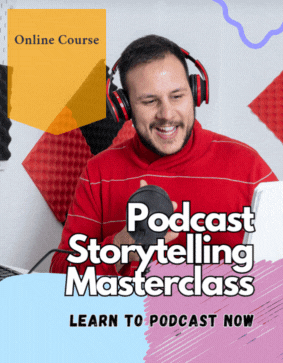Starting a Podcast: Where to start?
217,532 View
Share this Video
- Publish Date:
- May 23, 2025
- Category:
- Podcasting
- Video License
- Standard License
- Imported From:
- Youtube
Tags
Podcasting is a great way to share your knowledge and expertise, but where do you start? 🤔
Pat Flynn has some tips on how to start your podcasting journey:
1. Understand and figure out what your show is all about.
2. How can you describe your show to others?
3. Figure what title fits your show.
4. Start recording your episodes.
5. Plan your content ahead.
6. Make sure your content is share-worthy.
Watch the full video here: https://youtu.be/o7-3awzgPIo
===========================================
Subscribe here for new #shorts:
https://www.youtube.com/c/Buzzsprout
Like, comment, and subscribe for more content on how to start your podcast!
===========================================
We're also on:
Instagram: https://www.instagram.com/buzzsprout/
Twitter: https://twitter.com/buzzsprout
Facebook: https://www.facebook.com/groups/BuzzsproutCommunity
TikTok: https://www.tiktok.com/@buzzsprout
-----------------------------------------
Power Podcasting Made Easy
Power Podcasting Made Easy is your ultimate guide to launching a successful show—fast, fun, and with zero overwhelm. This bestselling course walks you through setup, hosting, publishing, and growth strategies. With over 32,000 students, you’ll learn how to use tools like Libsyn, reach Spotify and Google Podcasts, and even build a podcasting business. Whether you're brand new or ready to scale, Power Podcasting helps you grow influence, relationships, and revenue—all while whispering directly into the ears of your ideal audience. Ready to get your voice heard and change lives?
2 Must-Know Podcasting Tips for Your Show
Crafting Compelling Podcast Introductions

Your podcast introduction sets the tone for each episode and captures the listener’s attention from the start. Begin with a brief and impactful summary of the episode’s topic to inform your audience about what to expect. Use a consistent musical theme or jingle to create brand recognition. Introduce yourself and any co-hosts clearly, establishing a personal connection with your listeners. Incorporate a hook, such as a provocative question or an interesting fact, to pique curiosity. A well-crafted introduction not only engages listeners but also reinforces your podcast’s identity and purpose, encouraging them to continue listening.
Analyzing Podcast Metrics to Improve Performance

Monitoring and analyzing podcast metrics is crucial for understanding your audience and improving your show’s performance. Track key indicators such as download numbers, listener demographics, episode completion rates, and audience retention. Use analytics tools provided by your hosting platform or third-party services to gain insights into listener behavior and preferences. Identify which episodes perform best and analyze the factors contributing to their success, such as topics, guests, or formats. Pay attention to feedback and reviews to gauge audience satisfaction and areas for improvement. Regularly reviewing your metrics allows you to make informed decisions, optimize your content strategy, and enhance the overall quality and reach of your podcast.
Frequently Asked Questions
How long should a typical podcast episode be?
Episode length can vary, but typically ranges from 20 to 60 minutes. Choose a duration that suits your content and keeps your audience engaged without overwhelming them.
How often should I release new podcast episodes?
Consistency is key. Whether weekly, bi-weekly, or monthly, establish a schedule that you can maintain to keep your audience engaged and coming back for more.
What are effective ways to keep listeners coming back to my podcast?
Deliver consistent, high-quality content, engage with your audience, provide value in each episode, and build a strong connection through storytelling and relatable topics to retain listeners.
Should I use background music or sound effects in my podcast?
Background music and sound effects can enhance your podcast by setting the mood and emphasizing points. Use them sparingly to avoid distracting from the main content and maintain a professional sound.
Statistics
- High audio quality can lead to a 35% increase in listener retention rates.
- On average, podcasters spend about 10 hours per episode from planning to publishing.
- Podcasts with interactive segments, such as Q&A sessions, see a 25% boost in audience participation.
- Approximately 70% of successful podcasters invest in high-quality microphones to ensure clear audio.
- Podcasts that release episodes on Tuesdays and Thursdays see higher download rates by 30%.
- Approximately 40% of podcasters use background music to enhance the listening experience.
- About 55% of podcasters use interviews as a key strategy to provide diverse content.
- About 60% of podcasters find that offering premium content subscriptions generates additional revenue.
- Podcasts that engage with their audience through email newsletters see a 30% higher retention rate.
- Podcasts that include detailed show notes experience a 50% increase in listener engagement.
- Listener reviews and ratings contribute to a 25% increase in podcast discoverability.
- Collaborating with other podcasters can lead to a 20% growth in listener base.
- Effective use of keywords in podcast descriptions can improve search rankings by 30%.
- Podcasts with consistent weekly releases are 60% more likely to grow their audience steadily.
- Over 80% of podcasters report that having a dedicated website enhances their show’s visibility.
- Podcasts that utilize analytics to refine content strategies experience a 40% improvement in listener satisfaction.
External Links
transistor.fm
blog.libsyn.com
thepodcasthost.com
audacityteam.org
zoom.us
optimizingpodcasting.com
adobe.com
socialmediaexaminer.com
listennotes.com
podcastinsights.com
mailchimp.com
podcastgrandcentral.com
apple.com
hootsuite.com
patreon.com
podcastitalia.com
inc.com
How To
How To Optimize Your Podcast for SEO
Optimizing your podcast for search engines increases its visibility and attracts more listeners. Start by conducting keyword research to identify terms and phrases relevant to your podcast’s content and niche. Incorporate these keywords naturally into your episode titles, descriptions, and show notes to improve search rankings. Create a dedicated website or page for your podcast where you can publish transcriptions of your episodes, providing additional SEO value. Use descriptive and engaging language in your metadata, such as tags and categories, to help search engines understand your content. Encourage listeners to leave reviews and ratings, as user-generated content can also enhance your podcast’s SEO performance.















